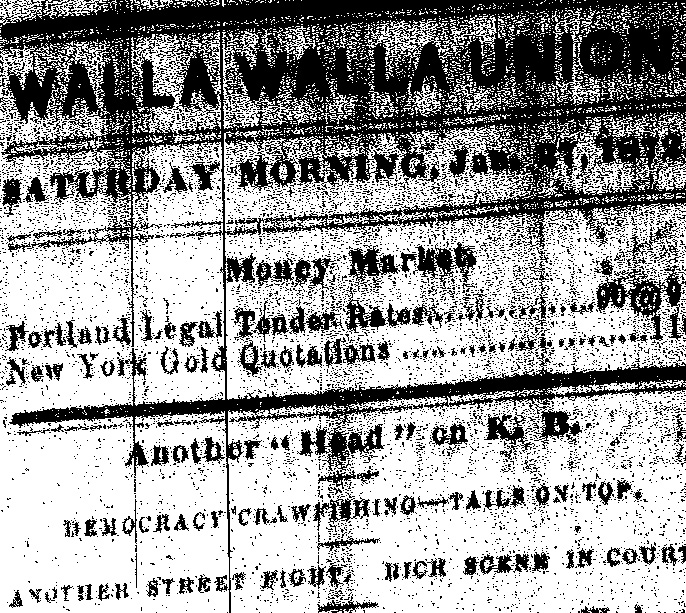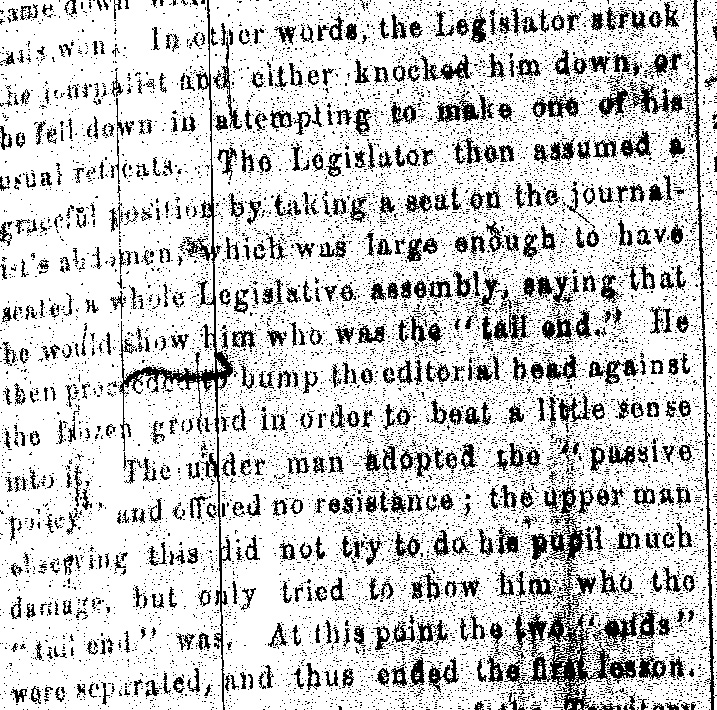The General Dullness Was Relieved– Two-Fisted Politics in Walla Walla
 Random News from the Newspapers on Microfilm Collection: The General Dullness Was Relieved– Two-Fisted Politics in Walla Walla
Random News from the Newspapers on Microfilm Collection: The General Dullness Was Relieved– Two-Fisted Politics in Walla Walla
From the desk of Steve Willis, Central Library Services Program Manager of the Washington State Library:
This January 27, 1872 article from the Walla Walla Union demonstrates Washington Territory was indeed part of the rough and ready Old West when it came to journalism and politics. The writer for the Republican paper is obviously enjoying the beating his rival, the editor of the Democratic Walla Walla Statesman received at the hands of an insulted legislator. The fact two Democrats were fighting each other seems to make the scene even more delicious to the writer. There are several inside jokes here that probably require long hours of research to decipher:
Another “Head” on K.B.
DEMOCRACY CRAWFISHING–TAILS ON TOP
ANOTHER STREET FIGHT. RICH SCENE IN COURT.
“The general dullness was relieved on Wednesday last, and all Walla Walla had a good laugh. The Editor of the Statesman, who considers himself the head of the Democratic party, has been throwing dirt at a member of the late legislature, whom he has dubbed the ‘tail end of the Walla Walla delegation,’ and ‘the tail end of the party,’ ‘evil genius,’ etc. Well, on the day mentioned, to borrow the Statesman’s idea, the head and tail met in front of the Court House. In the brief ‘toss-up’ that ensued, ‘heads’ came down with ‘tails’ on top. Heads lost– tails won.”
“In other words, the Legislator struck the journalist and either knocked him down, or he fell down in attempting to make one of his usual retreats. The Legislator then assumed a graceful position by taking a seat on the journalist’s abdomen, which was large enough to have seated a whole legislative assembly, saying that he would show him who was the ‘tail end.’ He then proceeded to bump the editorial head against the frozen ground in order to beat a little sense into it. The under man adopted the ‘passive policy’ and offered no resistance; the upper man observing this did not try to do his pupil much damage, but only tried to show him who the ‘tail end’ was. At this point the two ‘ends’ were separated, and thus ended the first lesson.”
“On the same afternoon the case of the Territory plaintiff, vs. J.H. Lasater, defendant, came on for hearing. The complaint charged that the aforesaid Lasater had, on the same day, committed an assault and battery upon one W.H. Newell. Considering the avoirdupois of the parties, and the weightiness of the charge, Chief Justice Horton called associate Justice Frush to assist him in sitting on the case. The people were represented by N.T. Caton, Prosecuting Attorney, and the defendant represented himself.”
“The complaint was read and defendant plead guilty to the soft impeachment, but just how guilty became the important question before the Court. Newell, the batteree, was called and sworn. When asked the question, ‘do you know the defendant?’ he evidently thought he was about to be sold if he answered yes, so he said, ‘I know the scrub.’ Here the defendant claimed the protection of the Court, and said that the witness should not call him pet names and that if he did so again he would protect himself. Witness subsided and was more respectful. He then went on and told his side of the story, which did not differ materially from our version above, except that he denied the running part of the fight. He got stubborn once or twice and refused to answer the defendant’s questions, but was admonished by the Court and persuaded by the defendant to answer. He insisted on making a speech instead of answering questions, but was, by the Court on the one side, and the defendant on the other, compelled to set down and let the defendant bore for truth.”
“The second witness called only saw half of the fight, and the third one did not see any. With this the prosecution rested; so did the defense. Prosecuting Attorney submitted the case without making any speech, but the defendant wanted his say. He told his side of the fight, and as he was on top, and in the best position to see what was going on, we are inclined to believe his version. He also told the reason why he put a head on the Editor, and said it was because he had tried to blackmail him, as he had almost every other citizen of the county. He said that if the Editor of the Statesman wanted peace he could have it by giving him a wide berth and letting him alone in the future, but that if the paper attacked him again, he will go for the editor again, and upon this proposition he rested his case.”
“The Prosecution replied and the Editor wanted to close, but was informed by the Court that he could make any remarks he chose after sentence was passed. The Court then assessed a fine of $20 against the defendant and adjourned. The defendant smiled, the audience laughed, and only one man frowned; that man was mad because the fine was not raised to $250, and because he had not been allowed to make a speech, and thus ended the second lesson.”
“The matter has caused no little comment, and so far as we can learn, all hands, except the man with the ‘head on,’ are satisfied. If there is no more vilification of the top man in the fight, then the matter is probably at an end, but if the Statesman persists in applying the appellation of ‘tail end’ to the winner of the late fight, then will come the third lesson, which will in all probability end the chapter.”
William H. Newell was about 50 at the time this article was originally published, and already a living legend in Pacific Northwest journalism. Here’s a description of him from Lyman’s History of Old Walla Walla County (available both in hardcopy and in digital form from WSL):
“Mr. Newell was a character, bold, energetic, caustic, and as a writer, incisive and forceful. It is related that once having a joint debate with Judge Caton, he began by saying: ‘Fellow citizens, it is a disagreeable task to skin a skunk, but sometimes it has to be done. I am going to skin N.J. Caton.’ Judge Caton reached for his hip-pocket and the meeting broke up in a general row, though it does not appear that any one was seriously hurt. The Statesman under Mr. Newell was democratic in politics and during the embroglio between President Johnson and Congress it was an active supporter of the former. It is said by some that its attainment of the place of United States official paper in the territory was due to that support. In 1878, the Statesman became a daily, the first in the Inland Empire. But on November 13th, the active, scheming mind of the editor was stilled by death.”
The Walla Walla Union ran from 1869 to 1891, when it merged with the Journal and Watchman to form The Weekly Union-Journal. The title ceased about 1904.
The rival Walla Walla Statesman is available on microfilm at WSL, and the years 1864-1869 have been digitized by our Digital and Historical Collections unit and can be viewed online.
